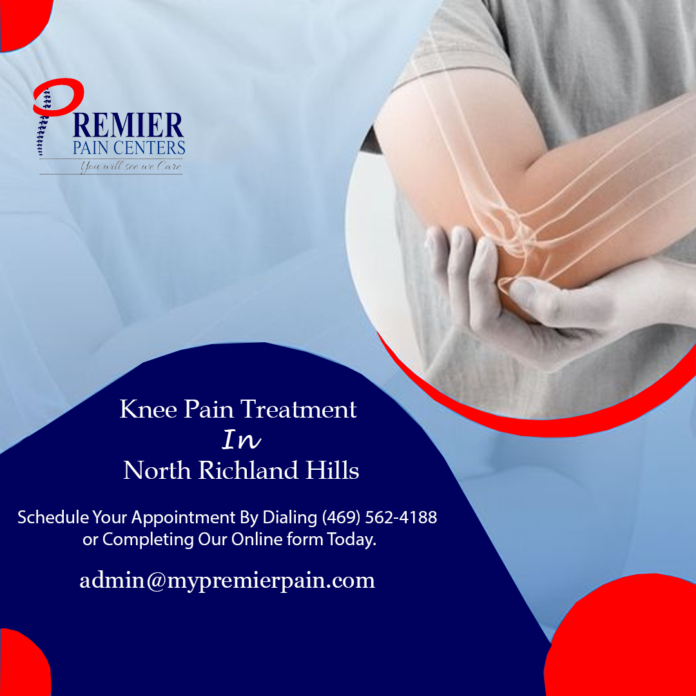Knee Osteoarthritis is a common and debilitating condition that affects millions of people worldwide. It is characterized by joint degeneration, inflammation, and pain in the knee joint. Genicular nerve block is an intervention that has been used to treat symptoms associated with this condition. This article will explore the effects of genicular nerve block on knee osteoarthritis, including its mechanism of action, potential benefits, as well as any associated risks and side effects.
Knee Osteoarthritis
Knee osteoarthritis, also known as degenerative joint disease or OA, is a progressive condition in which the natural cartilage that cushions the bones of the knee joint wears away. This causes pain and swelling, and can ultimately limit mobility. While knee osteoarthritis often occurs naturally due to aging, it can be exacerbated by conditions such as obesity or repetitive motion injuries.
The symptoms of knee osteoarthritis include stiffness in the joint after periods of rest, pain when standing and walking for prolonged periods of time, tenderness around the kneecap and difficulty straightening or bending the leg. Treatment options may include lifestyle changes such as losing weight, physical therapy exercises to strengthen muscles surrounding the knee joint and medications such as nonsteroidal anti-inflammatory drugs (NSAIDs). In some cases surgery may be necessary to replace parts of the damaged joint.
Causes of Knee OA
Knee osteoarthritis is one of the most common chronic joint disorders, and it affects millions of people around the world. It’s a degenerative joint condition that causes pain and stiffness in the knees due to deterioration of cartilage and underlying bone. There are several causes of knee osteoarthritis that can lead to this painful condition.
The primary cause of knee osteoarthritis is wear and tear on the joints from aging or an injury. Over time, this can cause the protective cartilage around the bones in your knees to break down, leading to pain and stiffness when you walk or climb stairs. Other causes include obesity, genetics, previous injuries or infections, overuse injuries such as runner’s knee, and occupations that involve repetitive kneeling or standing.
Symptoms of Knee OA
Knee osteoarthritis (OA) is a common condition characterized by the breakdown of joint cartilage and underlying bone within the knee. It’s a degenerative joint disease that can lead to symptoms such as pain, stiffness, swelling, and difficulty with everyday activities. Understanding the common signs and symptoms of knee OA may help people identify when they should seek medical help for their condition.
The most common symptom of knee OA is pain that increases with activity or weight bearing on the affected joint. Other symptoms include stiffness, especially first thing in the morning or after long periods of sitting; clicking or grinding noises when moving the joint; swelling around or near the affected area; decreased range of motion due to inflammation in surrounding tissue; instability – feeling like your knee may give out while walking; and warmth around the area due to increased blood flow associated with inflammation.
Genicular Nerve Block
Genicular Nerve Block is a procedure designed to reduce pain in the knee and lower leg. This minimally invasive technique involves injecting local anesthetic and/or steroid medication around the genicular nerves, which are located at the front, back and sides of the knee. It has been used successfully to treat chronic knee pain due to arthritis or trauma, as well as postoperative pain.

The aim of a Genicular Nerve Block is twofold: firstly, it blocks nerve signals that cause pain; secondly, it reduces inflammation in the surrounding area. Depending on individual factors such as age and health history, this procedure can provide long-term relief from chronic knee or lower leg pain. In some cases, a series of treatments may be required for optimal results.
Procedure of Genicular Nerve Block
Genicular nerve block is a minimally invasive procedure used to reduce pain and inflammation. It is most often used as part of a comprehensive treatment plan for knee osteoarthritis. The procedure involves injecting an anesthetic solution into specific areas around the knee, blocking pain signals from reaching the brain. Patients should speak to their physician about genicular nerve block before deciding if it’s right for them.
If I am looking for a Pain Management Clinic near me offering the Genicular Nerve Block Procedure, there are many options available. Searching online can help narrow your choices by location and clinic ratings so you can find one that best fits your needs and preferences. Additionally, ask your primary care doctor or other healthcare provider for recommendations on clinics in your area that provide genicular nerve block services.
Effects of GNB on Knee OA
Knee pain in North Richland Hills is a common problem, with many people suffering from chronic knee pain. One of the treatments for this condition is Glucosamine and Chondroitin Supplementation (GNB), which may help improve symptoms and reduce knee pain.
Studies have shown that taking GNB as part of a comprehensive treatment plan may help to improve joint function, reduce inflammation and swelling caused by OA, and provide relief from pain associated with OA. Additionally, GNB has been shown to slow down the progression of OA in those who take it regularly over an extended period of time. As such, it can be an effective tool for reducing symptoms in people living with knee OA in North Richland Hills.
Side Effects and Risks
Genicular nerve block is an innovative, minimally invasive procedure for treating knee osteoarthritis and relieving chronic pain. It involves injecting a combination of local anesthetics and/or steroids into the genicular nerve branches located near the knee joint. The goal is to reduce inflammation and alleviate pain, allowing patients to go about their daily activities with minimal discomfort. While it can provide significant relief from knee osteoarthritis symptoms, there are potential side effects and risks associated with the procedure that should be considered before undergoing treatment.
The most common short-term side effect of a genicular nerve block is soreness at the injection site which usually resolves within 48 hours after treatment. Additionally, some patients may experience temporary numbness or tingling in the affected area.
Conclusion
Genicular nerve block is a minimally invasive procedure used to provide relief from knee pain caused by osteoarthritis. The procedure, which has been gaining traction in recent years, involves injecting anesthetic and steroid into the genicular nerves that surround the knee. While it can provide effective short-term relief for many patients suffering from knee pain in North Richland Hills, there may be some side effects and risks associated with the treatment.
The most commonly reported side effect of genicular nerve block is soreness at the injection site. This usually resolves within a day, but may last longer if additional needles are used during the procedure or if more than one injection is given. Other potential side effects include temporary numbness or weakness around the injected area as well as minor bruising or bleeding at the injection site.







